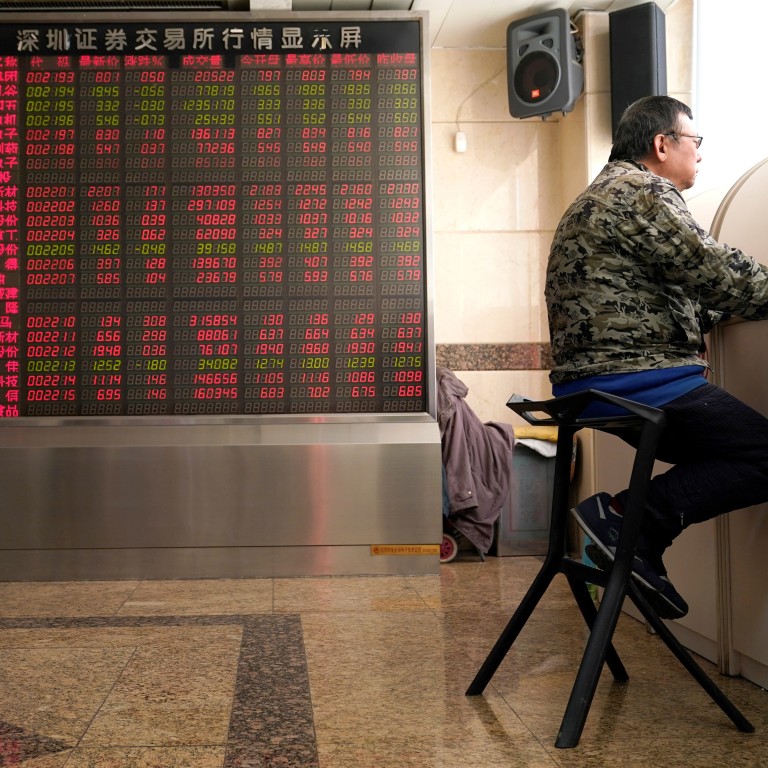
Beijing’s move to direct household savings into equities funds will ensure a bull run in stocks this year, analysts predict
- The financial watchdog published a guideline saying it will promote the conversion of household savings into long-term capital market funds
- Even steering a small portion of China’s US$10 trillion of household savings into the funds would translate into a huge windfall for the stock market, analysts said
China’s decision to direct money from the nation’s vast household savings into funds that invest in equities could support a further rally in the country’s stocks, analysts said.
The China Banking and Insurance Regulatory Commission (CBIRC), the financial watchdog, published a guideline saying it would promote the conversion of household savings into long-term capital market fund. It did not say how it would do this.
Even steering a small portion of China’s 70 trillion yuan (US$10 trillion) of household savings into the funds would translate into a huge windfall for the stock market, analysts said.
“As top financial regulators plan to direct more capital to stocks, they are taking a supportive stance on the equity market,” said Zhou Ling, a hedge fund manager at Shanghai Shiva Investment. “All signs are showing that the [Chinese stock] market would turn into a bullish mode with a series of market-moving measures.”
With global confidence returning, a stock market boom is on the cards for 2020
The guideline, released on Saturday evening, is the first of a series of reforms expected to be announced this year aimed at liberalising China’s financial markets.
Guotai Junan Securities recently predicted the benchmark Shanghai Composite Index could break through the 3,300 level soon, buoyed by Beijing’s determination to overhaul the stock market.
The key gauge closed edged down 0.38 point to 3,083.41 on Monday, after rallying 22.3 per cent last year.
Household savings represent about 80 per cent of mainland China’s gross domestic product.
The regulator did not elaborate on how the household savings would be converted into the stock investment funds, but one method would be to allow banks to use a proportion of their deposits to buy mutual funds.
Beijing had long been wary of directing bank deposits towards the stock market, where high volatility can put people’s savings at risk.
Over the past three decades millions of small investors, most of them retired workers, have been left penniless after betting everything on the roller-coaster of the A-share market. A shares refers to yuan-denominated shares in Chinese firms, traded on the domestic market.
Beijing hopes to create a powerful mutual fund industry to curb market volatility, encouraging investors to buy shares based on valuations rather than rumours.
Efforts to fine-tune the A-share trading system and attract foreign institutional buying have been paying off over the past two years.
MSCI, the global index compiler, last year allocated more weight to Chinese A shares in its global emerging-market benchmarks.
After it added more Chinese stocks to the index in November, China International Capital Corporation expected additional inflows of up to US$40 billion from overseas passive and active funds.
China’s stock market is a liquidity-driven market where turnover is seen as a key gauge of market trends.
Chinese tech shares remain favourites for 2020 amid Beijing’s 5G boom
As regulators encourage capital to flow in to the capital markets, mainland-listed stocks should therefore be able to maintain their upwards momentum, even against the backdrop of a slowing economy.
“Aside from the talks about additional capital inflow, a series of positive measures by the regulators are expected to support a market rally,” said Ivan Li, asset manager with Shanghai-based Loyal Wealth Management. “The monetary easing and market-based reform are the major driving forces.”
Early this month, the People’s Bank of China moved to cut the required cash reserve ratio for commercial lenders by 50 basis points, injecting 800 billion yuan of liquidity into the financial system.
The China Securities Regulatory Commission (CSRC), another regulator, also pledged to give market forces a full play in pricing initial public offering (IPO) shares as it conducts market-based reforms which include adopting on a registration-based IPO system.
The CBIRC also said it would let insurers allocate more assets to invest in equities.
Mainland insurance companies can currently invest up to 25 per cent of their total assets in equities.

